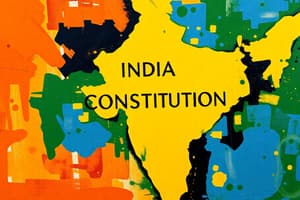Podcast
Questions and Answers
Which article of the Indian Constitution guarantees equality before the law?
Which article of the Indian Constitution guarantees equality before the law?
- Article 17
- Article 16
- Article 15
- Article 14 (correct)
Which fundamental right in the Indian Constitution specifically addresses freedom of religion?
Which fundamental right in the Indian Constitution specifically addresses freedom of religion?
- Article 25 (correct)
- Article 19(1)(a)
- Article 32
- Article 21
What is the purpose of fundamental rights in the Indian Constitution?
What is the purpose of fundamental rights in the Indian Constitution?
- To promote state control over citizens
- To limit citizens' freedom
- To provide citizens with essential protections against arbitrary state action (correct)
- To encourage inequality among citizens
What is the significance of fundamental duties in the Indian Constitution?
What is the significance of fundamental duties in the Indian Constitution?
How do fundamental rights evolve in the Indian Constitution?
How do fundamental rights evolve in the Indian Constitution?
Which Article in the Indian Constitution provides protection against double jeopardy?
Which Article in the Indian Constitution provides protection against double jeopardy?
Which amendment introduced the right to education (Article 21A) in the Indian Constitution?
Which amendment introduced the right to education (Article 21A) in the Indian Constitution?
Which fundamental right in the Indian Constitution includes protection against exploitation?
Which fundamental right in the Indian Constitution includes protection against exploitation?
In the Indian Constitution, which article guarantees protection against arrest and detention in certain cases?
In the Indian Constitution, which article guarantees protection against arrest and detention in certain cases?
How does the Indian Constitution empower citizens through fundamental rights and duties?
How does the Indian Constitution empower citizens through fundamental rights and duties?
Which fundamental right in the Indian Constitution provides for the protection of certain rights regarding education?
Which fundamental right in the Indian Constitution provides for the protection of certain rights regarding education?
What example does India set for other nations through its respect for fundamental rights?
What example does India set for other nations through its respect for fundamental rights?
Flashcards are hidden until you start studying
Study Notes
Indian Constitution: Fundamental Rights and Answers
The Indian Constitution, adopted on January 26, 1950, is a beacon of democratic principles. It guarantees citizens' rights and duties, affording a unique legal framework that shapes the nation's ideals.
Questions and Answers
-
What day does India celebrate Constitution Day? Ans: January 26
-
Who led the drafting committee of the Indian Constitution? Ans: Dr. B.R. Ambedkar
-
How many fundamental rights are enshrined in the Indian Constitution? Ans: 6
-
Which fundamental right guarantees equality before the law? Ans: Article 14
-
Which fundamental right ensures the right to life and personal liberty? Ans: Article 21
-
Which fundamental right provides freedom of speech and expression? Ans: Article 19(1)
-
Which fundamental right guarantees the right to constitutional remedies? Ans: Article 32
-
Which fundamental right protects the national language, Hindi, and other Indian languages? Ans: Article 343
-
Which fundamental right secures the right to education? Ans: Article 21A, added by the 86th Amendment Act 2002
-
Who was the chairman of the Advisory Committee on Fundamental Rights, Minorities, and Tribal and Excluded Areas of the Constituent Assembly of India? Ans: Vallabhbhai Patel
-
In which part of the Indian Constitution are the fundamental duties enshrined? Ans: Part IV A, Article 51 A
Fundamental Rights and Constitutional Context
Fundamental rights are a cornerstone of the Indian Constitution, providing citizens with essential protections against arbitrary state action and fostering a democratic, humane, and just society. The Indian Constitution also enshrines fundamental duties to promote an egalitarian, compassionate, and responsible citizenry.
The Indian Constitution's fundamental rights are a living document, ever-evolving to meet the needs of a rapidly changing society. Amendments have been enacted to protect and expand the rights of the underprivileged, such as the addition of the right to education (Article 21A) by the 86th Amendment Act 2002.
In conclusion, the Indian Constitution has provided a robust legal framework that guarantees fundamental rights and duties, empowering citizens to shape a just, humane, and democratic society. By respecting and upholding these rights, India has set an example for nations worldwide, striving to ensure the dignity and well-being of all its citizens.
Studying That Suits You
Use AI to generate personalized quizzes and flashcards to suit your learning preferences.




